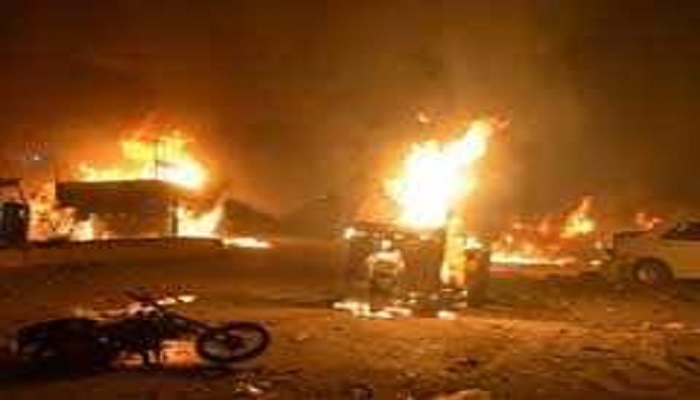KABUL: At least nine people were killed in two bomb blasts aboard separate minibuses in Mazar-i-Sharif, Afghanistan, on Thursday, authorities said, a week after a devastating explosion rocked a Shia mosque in the northern city.
Since the Taliban retook power in Afghanistan last August, the number of violent public attacks has decreased, but the extremist Islamic State group has continued to target Shias.
During the fasting month of Ramazan, a series of devastating bombs targeting members of minority populations have wracked the country, killing and injuring scores. According to Balkh provincial police spokesman Asif Waziri, the bombs occurred within minutes of each other in different areas of Mazar-i-Sharif as commuters were heading home to break their dawn-to-dusk Ramazan fast.
“It appears that the targets are Shia travellers,” he said, adding that 13 people were injured in the explosions.
“Afghanistan’s adversaries are sowing discord and division among our people.” No one has claimed responsibility for the bombings as of yet.
One minibus was engulfed in flames, while the other was damaged with Taliban fighters carrying casualties from the vehicle to hospitals, according to images shared on social media.
The explosions occurred just a week after a horrific bombing at a mosque in Mazar-i-Sharif killed at least 12 worshippers and injured dozens more.
A day later, a separate bomb attack on a mosque in the northern city of Kunduz, which targeted the minority Sufi population, occurred.
During Friday prayers, it killed at least 36 individuals.
Six children were killed when two explosives detonated at a school in Kabul, also targeting Shias.
The extremist IS claimed credit for the mosque attack in Mazar-i-Sharif, but no one has claimed responsibility for the bombings in Kunduz and Kabul. Shia Afghans, especially from the Hazara ethnicity, account for between 10% and 20% of Afghanistan’s 38 million inhabitants.
IS has routinely targeted Shias and minorities in Afghanistan, including Sufis, who follow a mystical strain of Islam. Officials from the Taliban claim that their forces have beaten ISIS, but observers warn the jihadist group remains a major security threat.
Several arrests have been made in connection with recent attacks, according to Afghan government spokesman Zabihullah Mujahid.
“These attacks targeted sites that did not have appropriate protection, like as mosques and schools,” he added, adding that “we have now increased up security in such places.”




















